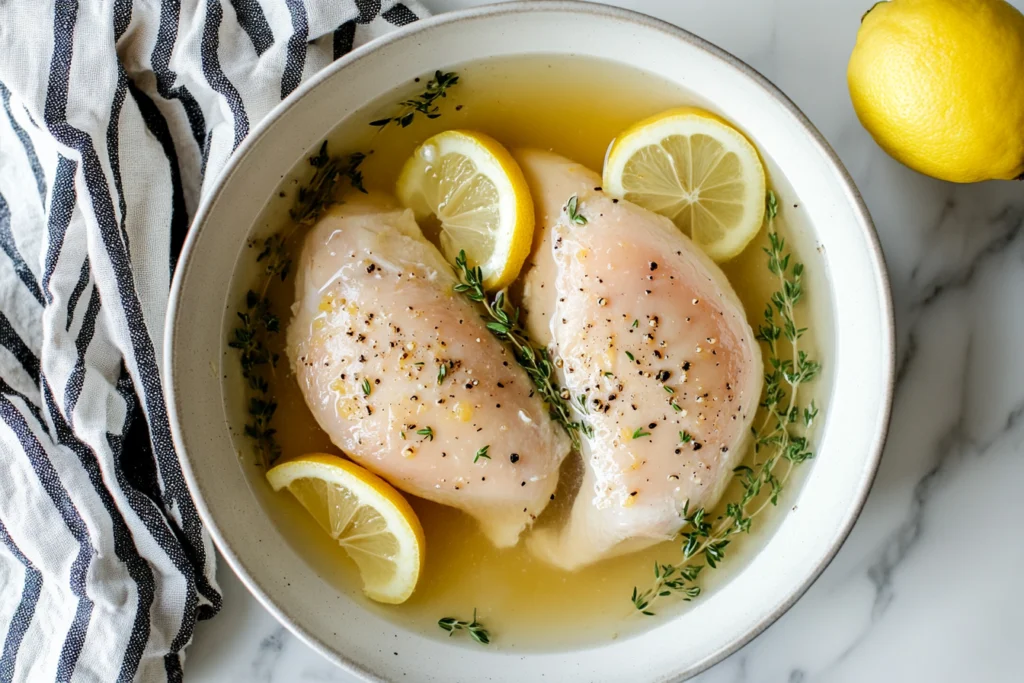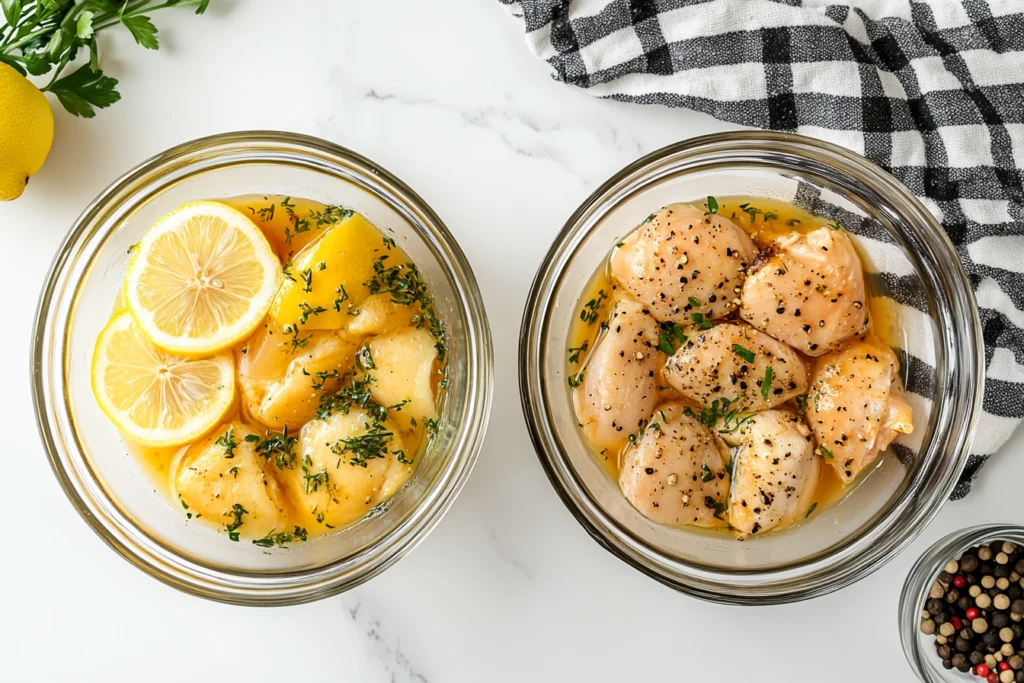Why Do You Soak Chicken in Lemon Juice? Soaking chicken in lemon juice is a culinary practice that combines flavor enhancement with functional benefits. This age-old technique is more than just a flavoring method; it’s a science-backed way to tenderize meat, remove unpleasant odors, and infuse it with a zesty, vibrant taste. Throughout this article, we’ll explore how lemon juice works its magic, the benefits and risks involved, and the best practices for marinating chicken to perfection. You’ll also learn step-by-step methods, compare lemon juice with other marinades, and answer frequently asked questions about this fascinating topic. Let’s dive in!
Introduction
What Does Soaking Chicken in Lemon Juice Mean?
Soaking chicken in lemon juice refers to marinating raw chicken in freshly squeezed or bottled lemon juice. This process allows the acidity in lemon juice to break down proteins in the chicken, making it tender and flavorful. It’s a practice embraced by chefs and home cooks alike to prepare chicken that’s juicy, aromatic, and packed with zest.
The acidic nature of lemon juice isn’t just for taste. It plays a role in food safety, as it can minimize bacteria on the chicken’s surface. However, its primary purpose remains improving the chicken’s texture and flavor. This approach is especially common in recipes where tenderness and tangy notes are essential.
Why This Practice Is Popular in Cooking?
There’s something universally appealing about the tangy zing of lemon. When combined with chicken, it creates a delightful balance of savory and sour. This is why lemon juice marination is commonly used in dishes like grilled chicken, baked casseroles, or even simple stir-fries.
But why has it stood the test of time? For one, it’s natural and versatile. Unlike processed marinades, lemon juice is a healthier choice, offering a burst of flavor without artificial additives. Secondly, its ability to neutralize odors makes it ideal for preparing poultry, which can sometimes have a strong, unappetizing smell.
Beyond taste and functionality, marinating with lemon juice is a straightforward technique that doesn’t require fancy tools or advanced cooking skills. Whether you’re preparing for a family dinner or experimenting with a new recipe, this simple ingredient can elevate your cooking game.
Learn more about how acidity improves food quality.
Science Behind Lemon Juice and Chicken
How Lemon Juice Works on Chicken Proteins
The magic of soaking chicken in lemon juice lies in its acidity. Lemons are rich in citric acid, a natural compound that interacts with the proteins in chicken. When raw chicken is marinated in lemon juice, the acid begins to denature the protein molecules, unraveling them and making the meat softer. This process, scientifically known as “protein denaturation,” is the key to tenderizing tough chicken cuts.
The acid essentially weakens the bonds within the chicken’s muscle fibers, allowing them to retain moisture more effectively during cooking. This is why chicken marinated in lemon juice often turns out juicier and more succulent compared to un-marinated chicken.
However, overexposure to acid can turn the outer layer of the chicken into a mushy texture—almost like it’s been partially cooked. So, timing is everything to achieve the perfect balance between tenderizing and maintaining the chicken’s structural integrity.
The Role of Acidity in Tenderizing Meat
Acidity isn’t just about breaking down proteins. It also impacts the overall flavor profile of the chicken. The slightly sour taste of lemon juice balances the natural savory notes of poultry, creating a harmonious blend that enhances every bite.
Interestingly, lemon juice has a pH level of about 2, making it highly acidic. This acidity is why it’s such a powerful tenderizer. By penetrating the chicken’s surface, it not only makes the meat tender but also prepares it to absorb additional flavors from other marinade ingredients, such as garlic, herbs, and spices.
It’s also worth noting that the acidic environment created by lemon juice helps to preserve some of the chicken’s freshness by slowing down bacterial growth. Although it doesn’t fully eliminate bacteria, it provides an additional layer of safety before cooking.
Flavor Infusion Through Lemon Juice
When you soak chicken in lemon juice, you’re not just softening the meat—you’re infusing it with a vibrant, citrusy aroma. Lemon juice acts as a flavor carrier, seeping into the chicken fibers and elevating their taste. For a balanced marinade, lemon juice is often paired with olive oil, herbs like rosemary or thyme, and spices such as black pepper or paprika.
This combination allows the chicken to soak up complementary flavors, creating a depth of taste that feels gourmet yet approachable. The longer the chicken marinates, the more pronounced these flavors become, but as we’ll discuss later, marination time should be carefully monitored to avoid over-tenderizing.
Benefits of Soaking Chicken in Lemon Juice
Tenderizing Tough Chicken Cuts
One of the biggest advantages of soaking chicken in lemon juice is its ability to tenderize tougher cuts of meat. Cuts like chicken thighs, drumsticks, or even older poultry can be challenging to cook evenly due to their dense muscle fibers. Lemon juice softens these fibers, allowing for a juicier and more enjoyable texture after cooking.
For recipes like grilled chicken or pan-seared dishes, tenderizing with lemon juice ensures that even the leaner parts of the meat remain moist. This soaking process works faster than most other marinades, making it perfect for quick preparations. Soaking chicken in lemon juice also creates a great base for seasoning, enhancing both tenderness and flavor.
Enhancing Flavor Profiles
Lemon juice doesn’t just tenderize—it adds a zesty brightness that amplifies the natural flavors of chicken. Whether you’re preparing Mediterranean-inspired dishes or simple roasted chicken, the citrusy tang balances the richness of the meat while complementing other ingredients in the recipe.
By soaking chicken in lemon juice, the meat absorbs subtle yet impactful notes of citrus, creating a vibrant, well-rounded flavor. Pairing lemon juice with garlic, herbs, or honey can create a dynamic taste profile, making the chicken ideal for any culinary setting, from family dinners to festive feasts.
Removing Unpleasant Odors
Raw chicken sometimes carries an unpleasant smell, especially if it’s been refrigerated for a few days. Soaking chicken in lemon juice acts as a natural deodorizer. Its strong, fresh aroma masks any unwanted odors and refreshes the chicken, making it more appealing to work with.
This step is particularly useful when dealing with chicken sourced from bulk packs, where slight variations in freshness can occur. Just a few tablespoons of lemon juice can neutralize the odor and improve the overall preparation experience, making it easier to enjoy the cooking process.
Boosting Nutritional Value with Vitamin C
Soaking chicken in lemon juice isn’t just about taste or texture; it’s also a nutritional powerhouse. Packed with Vitamin C, lemon juice adds a health boost to your marinated chicken. While the primary benefits of Vitamin C come from consuming fresh fruits and vegetables, some of it is retained in the cooked chicken, contributing to immune health and antioxidant properties.
Additionally, using lemon juice in your cooking eliminates the need for calorie-heavy sauces or artificial flavor enhancers, making it a healthier choice for flavoring your meals. By soaking chicken in lemon juice, you’re enhancing not only the taste and texture but also the nutritional value of your dish.
Risks and Precautions
Does Lemon Juice Over-Tenderize Chicken?
While soaking chicken in lemon juice is a fantastic natural tenderizer, it comes with a caveat: too much marination time can lead to over-tenderizing. This happens when the acid in lemon juice breaks down the chicken’s proteins too aggressively, resulting in a texture that’s mushy or unappetizing.
If you’ve ever bitten into chicken that feels slimy or overly soft, it’s likely been marinated for too long. The key is balance—soaking chicken in lemon juice for no more than 30 minutes to 2 hours is usually recommended. Going beyond this window may compromise the meat’s texture and lead to a less enjoyable dish.
By mastering the timing when you soak chicken in lemon juice, you ensure that the meat remains tender without becoming overly soft. This approach maintains the chicken’s natural texture while infusing it with just the right amount of citrusy brightness.
How Long Should You Soak Chicken?
Timing plays a crucial role in achieving the perfect marination. While lemon juice works quickly, marinating chicken for as little as 20 minutes can already impart flavor and some degree of tenderization. For optimal results:
- Thin cuts like chicken breasts: 30 minutes to 1 hour
- Thicker cuts like drumsticks or thighs: 1 to 2 hours
Overnight marination in lemon juice is generally not recommended due to the risk of over-tenderization. If you need to marinate overnight, consider reducing the lemon juice and pairing it with a neutral ingredient like yogurt or olive oil to dilute the acid’s intensity.
Acidic Reactions and Food Safety Concerns
Using an acidic marinade like lemon juice does raise some food safety considerations. While the acid can slow bacterial growth on the surface of the chicken, it doesn’t eliminate all pathogens. Always remember that marination is not a substitute for proper cleaning and thorough cooking.
Additionally, when marinating chicken in lemon juice, it’s important to avoid using reactive containers such as those made from aluminum. The acid in lemon juice can react with these materials, potentially altering the taste of the marinade and posing health risks. Instead, opt for non-reactive materials like glass, ceramic, or food-safe plastic containers.
Lastly, discard any leftover marinade that has come into contact with raw chicken. While it may be tempting to reuse it as a sauce, doing so without cooking it thoroughly can lead to cross-contamination.
How to Soak Chicken in Lemon Juice: Step-by-Step Guide

Choosing the Right Lemon and Ingredients
Not all lemons are created equal when it comes to marinating chicken. For the best results, opt for fresh, juicy lemons. Freshly squeezed lemon juice has a brighter, more natural flavor than bottled alternatives, which may contain preservatives or diluted acidity.
Additionally, enhance your marinade with complementary ingredients like minced garlic, fresh herbs (rosemary, thyme, or parsley), a splash of olive oil, and a pinch of salt and pepper. These additions balance the acidity of the lemon juice and add layers of flavor.
Preparation: Cutting and Cleaning the Chicken
Before marinating, it’s essential to prep the chicken properly. Begin by rinsing the chicken under cold water and patting it dry with paper towels. Removing excess moisture allows the marinade to adhere better to the chicken.
If you’re working with larger cuts, consider scoring the chicken lightly with a knife. This helps the lemon juice penetrate deeper into the meat, enhancing both tenderness and flavor. Always use a separate cutting board for raw chicken to avoid cross-contamination.
Soaking Techniques: Tips and Tricks
Here’s a step-by-step process for marinating chicken in lemon juice:
- Combine Ingredients: In a non-reactive bowl, mix lemon juice, olive oil, minced garlic, chopped herbs, and any additional seasonings. Adjust proportions based on the amount of chicken you’re marinating.
- Add the Chicken: Place the chicken pieces into the bowl, ensuring they are fully submerged in the marinade. If needed, turn the chicken over a few times to coat all sides evenly.
- Cover and Chill: Cover the bowl with plastic wrap or transfer the chicken and marinade to a resealable plastic bag. Refrigerate for the appropriate duration (20 minutes to 2 hours, depending on the cut).
- Discard the Marinade: Once marinated, discard the lemon juice mixture. It’s not safe to use raw chicken marinade as a sauce unless it’s boiled first.
Recipes That Use Lemon Juice-Marinated Chicken
Marinating chicken in lemon juice opens the door to a wide range of delicious recipes. Some popular options include:
- Grilled Lemon Chicken: Grill marinated chicken breasts for a smoky, zesty meal.
- Oven-Baked Lemon Herb Chicken: Bake marinated thighs with extra herbs and sliced lemons for added moisture.
- Stir-Fried Lemon Chicken: Quick and easy, this dish pairs tender chicken with vegetables in a tangy lemon glaze.
By soaking chicken in lemon juice, you can elevate everyday meals into flavorful culinary creations.
Comparisons with Other Marinades

Lemon Juice vs. Vinegar: Which Is Better?
Both lemon juice and vinegar are popular acidic marinades, but they have distinct characteristics. Lemon juice offers a fresh, citrusy flavor that pairs beautifully with poultry. It tenderizes chicken while infusing it with a bright, tangy aroma, making it ideal for recipes where a burst of citrus is desired.
Vinegar, on the other hand, is more potent in acidity and has a sharper, more pungent taste. While it also tenderizes meat, its flavor can overpower delicate dishes, making it better suited for hearty recipes like barbecue or slow-cooked stews. If subtlety is your goal, lemon juice is the better choice.
How Does Lemon Juice Compare with Other Citrus Fruits?
Other citrus fruits, such as limes, oranges, and grapefruits, can be used as marinades, each bringing a unique flavor to the table. Limes have a sharper, more tart taste than lemons, offering a punchy alternative for dishes with bold spices. Oranges are sweeter and less acidic, making them a good choice for mild, sweeter marinades. Grapefruit falls somewhere in between, with a complex bittersweet profile that can add depth to certain recipes.
Compared to these options, lemon juice strikes a perfect balance between acidity and versatility. It enhances the flavor of chicken without overpowering it and complements a wide range of herbs and spices.
What About Store-Bought Marinades?
Pre-packaged marinades can be convenient, but they often contain preservatives, artificial flavors, and added sugars. While these marinades might save time, they lack the freshness and nutritional benefits of a homemade lemon juice marinade.
Additionally, many store-bought options fail to replicate the natural acidity of lemon juice, relying on synthetic acids that don’t tenderize as effectively. If health and flavor are priorities, a fresh lemon juice marinade is the superior choice.
FAQs Section
Does Lemon Juice Kill Bacteria on Chicken?
Lemon juice has mild antibacterial properties due to its high acidity, which can help minimize bacteria on the surface of raw chicken. However, it doesn’t completely eliminate harmful pathogens like Salmonella or E. coli. Always clean chicken properly, handle it with care, and cook it thoroughly to ensure food safety.
Can Lemon Juice Make Chicken Too Sour?
Yes, if you use too much lemon juice or marinate the chicken for too long, it can overpower the dish with an excessively sour taste. To avoid this, balance the marinade with ingredients like olive oil, garlic, or honey, which help mellow the acidity and create a more balanced flavor profile.
Should You Use Fresh Lemon Juice or Bottled?
Fresh lemon juice is always the better option. It has a brighter and more natural flavor compared to bottled juice, which often contains preservatives that can alter the taste. If fresh lemons aren’t available, ensure the bottled option is 100% pure lemon juice with no added sugar or artificial flavors.
Can You Substitute Lemon Juice with Lime Juice?
Absolutely! Lime juice can be used as a substitute for lemon juice in most recipes. It offers a similar level of acidity but has a slightly more tart and vibrant flavor. This can work well in dishes with tropical or Mexican-inspired flavors.
Is Soaking Chicken in Lemon Juice Necessary for All Recipes?
Not every recipe requires marinating chicken in lemon juice. While it’s ideal for enhancing flavor and tenderizing meat, some dishes—like fried chicken—might benefit more from other marinades or brines. It depends on the dish’s flavor profile and the texture you’re aiming to achieve.
What Happens If You Don’t Rinse Lemon Juice Off?
Leaving lemon juice on chicken before cooking can result in a sour or overly acidic taste, especially on the exterior. For the best results, lightly rinse the chicken after marinating and pat it dry before cooking. This ensures the flavor is balanced without being overpowering.
Conclusion
Recap of the Key Points
Soaking chicken in lemon juice is more than a culinary trick—it’s a science-backed method to tenderize, enhance flavor, and elevate your cooking. The acidity in lemon juice softens the chicken’s muscle fibers, making it juicier and easier to cook. Additionally, its fresh, zesty profile neutralizes unpleasant odors and infuses the meat with a vibrant citrus aroma.
We’ve explored the many benefits of this technique, from its ability to tenderize tough cuts to its role in adding nutritional value with Vitamin C. However, it’s important to marinate chicken for the right amount of time and handle it safely to avoid risks like over-tenderizing or food contamination.
Final Thoughts: Why Lemon Juice Is a Game-Changer in Cooking
Whether you’re grilling, baking, or stir-frying, marinating chicken in lemon juice can transform an ordinary dish into something extraordinary. Its versatility makes it suitable for countless recipes, and it pairs beautifully with herbs, spices, and other ingredients.
By following the tips and precautions outlined in this guide, you can confidently use lemon juice to prepare flavorful, tender chicken every time. It’s a simple yet effective way to bring freshness and sophistication to your meals. So next time you’re in the kitchen, grab a lemon and see the difference for yourself—your taste buds will thank you!


9 thoughts on “Why Do You Soak Chicken in Lemon Juice? Ultimate 5 Benefits, Risks, and Tips”